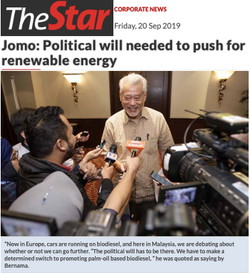- Jan 21
- 4 min read
By Jomo Kwame Sundaram
KUALA LUMPUR, Malaysia, Jan 21 2025 (IPS) - Corporate-dominated food systems are responsible for widespread but still spreading malnutrition and ill health. Poor diets worsen non-communicable diseases (NCDs), now costing over eight trillion dollars yearly!
Unhealthy food systems
A recent UN Food and Agriculture Organization (FAO) study of 156 countries found that such food systems account for unsafe food and diet-related NCDs.
FAO estimates related ‘hidden costs’ at about $12 trillion annually, with 70% ($8.1 trillion) due to NCDs such as heart disease, strokes and diabetes. Such costs significantly exceed these food systems’ environmental and social costs.
FAO’s annual State of Food and Agriculture 2024 (SOFA) investigated hidden costs worldwide. These were primarily health-related, followed by environmental degradation, mainly in more ‘industrialised’ agri-food systems in upper-middle and high-income countries.
SOFA 2024 builds on the 2023 SOFA. The two-year study uses true cost accounting to estimate significant costs and benefits of food production, distribution and consumption.
The study estimates “hidden costs and benefits”, including those not reflected by market prices. The latest SOFA updates cost estimates, classifies them by agrifood system, and proposes solutions.
The report identifies 13 dietary risks with health implications, with significant differences among various food systems. Inadequate consumption of whole grains (the leading dietary risk in most food systems), fruits, and vegetables is the worst, while excessive sodium and meat consumption cause significant health risks.
Hidden costs
SOFA 2024 identifies historical transitions from traditional to industrial agrifood systems, their outcomes, and hidden costs. It distinguishes six food systems worldwide – traditional, expanding, diversifying, formalising, industrial, and protracted crisis – and links each to hidden costs.
This approach enables a better understanding of each system’s unique features and the design of more appropriate policies and interventions.
However, inadequate fruit and vegetable intake is the main concern during protracted crises – e.g., prolonged conflicts, instability, and widespread food insecurity – and in traditional systems with low productivity, limited technology adoption, and shorter value chains.
Excessive sodium consumption is another significant health concern, rising as food “systems evolve from traditional to formalising, peaking in the latter and then decreasing in industrial systems”.
Meanwhile, processed and red meat intake rises with the shift from traditional to industrial systems. Meat is one of industrial food systems’ top three dietary risk factors. Adverse environmental impacts of unsustainable agronomic practices contribute significantly to hidden costs.
Such costs – due to greenhouse gas emissions, nitrogen runoffs, land-use changes, and water pollution – rise with diversifying food systems. Rapid growth typically involves changing food production and consumption, costing $720 billion more yearly.
Formalising and industrial food systems also incur significant environmental costs. However, countries facing protracted crises face the highest environmental costs, equivalent to a fifth of their output.
Social costs, including poverty and undernourishment, are most significant in traditional food systems and more vulnerable to protracted crises, incurring around 8% and 18% of GDP, respectively.
Such high social costs emphasise the urgent need for integrated efforts to improve livelihoods and well-being, reflecting stakeholder priorities and sensitivity to local circumstances.
Collective action
SOFA 2024 seeks to promote “more sustainable, resilient, inclusive, and efficient” food systems. It uses true cost accounting to identify hidden costs, going well beyond traditional economic measures such as the gross domestic product (GDP).
Using realistic and pragmatic approaches, policymakers make better-informed decisions to enhance food systems’ social contributions. More comprehensive approaches should acknowledge the crucial contributions of food systems to food security, nutrition, biodiversity, and culture.
Such transformations require transcending conceptual divides, ensuring health, agricultural, and environmental policy coherence, and fairly sharing costs and benefits among all stakeholders.
The report stresses that this requires collective action involving diverse stakeholders, which is difficult to achieve. Such stakeholders include consumers, primary producers, agribusinesses, governments, financial institutions, and international organisations.
Addressing hidden costs affects various stakeholders differently. Appropriate frameworks, supportive policies, and regulations ease implementation and minimise disruption by adopting sustainable practices early and protecting the vulnerable.
Recommendations
Recognising food systems’ adverse consequences for diets and health, the report makes several key recommendations quite different from those of the Davos World Economic Forum-compromised 2021 UN Food Systems Summit. It urges:
• incentivising the promotion of advancing sustainable food supply chain practices and balancing among food system stakeholders.
• promoting healthy diets by making nutritious food more affordable and accessible, reducing adverse health consequences and costs.
• using labelling, certification, standards, and due diligence to reduce greenhouse gas and nitrogen emissions, harmful land-use changes, and biodiversity loss.
• empowering society with comprehensive, clear, accessible, and actionable food and nutrition education and information about food choices’ health, environmental, and social impacts.
• using collective procurement’s significant purchasing power and influence to improve food supplies and the environment.
• ensuring inclusive rural transformations while reducing hidden health, environmental and social costs.
• strengthening civil society and governance to enable and accelerate sustainable and fair food system innovations and enhance social well-being, especially for vulnerable households.
Available here online: https://www.ipsnews.net/2025/01/food-systems-worsen-diets-health/


















